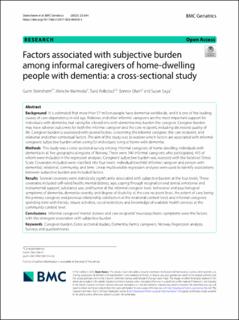| dc.description.abstract | Background
It is estimated that more than 57 million people have dementia worldwide, and it is one of the leading causes of care dependency in old age. Relatives and other informal caregivers are the most important support for individuals with dementia, but caring for a loved one with dementia may burden the caregiver. Caregiver burden may have adverse outcomes for both the informal caregiver and the care recipient, including decreased quality of life. Caregiver burden is associated with several factors concerning the informal caregiver, the care recipient, and relational and other contextual factors. The aim of this study was to explore which factors are associated with informal caregivers’ subjective burden when caring for individuals living at home with dementia.
Methods
This study was a cross-sectional survey among informal caregivers of home-dwelling individuals with dementia in all five geographical regions of Norway. There were 540 informal caregivers who participated, 415 of whom were included in the regression analyses. Caregivers’ subjective burden was assessed with the Relatives’ Stress Scale. Covariates included were classified into four levels: individual (twofold: informal caregiver and person with dementia), relational, community, and time. Linear multivariable regression analyses were used to identify associations between subjective burden and included factors.
Results
Several covariates were statistically significantly associated with subjective burden at the four levels. These covariates included self-rated health, mental distress, age, coping through resignation and denial, emotional and instrumental support, substance use, and humor at the informal caregiver level; behavioral and psychological symptoms of dementia, dementia severity, and degree of disability at the care recipient level; the extent of care, being the primary caregiver, and previous relationship satisfaction at the relational context level; and informal caregivers spending time with friends, leisure activities, social restriction, and knowledge of available health services at the community context level.
Conclusions
Informal caregivers’ mental distress and care recipients’ neuropsychiatric symptoms were the factors with the strongest association with subjective burden. | en_US |

